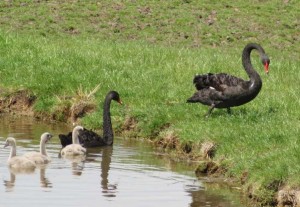Swan Songs
/ On the way back from Hobart the other day, we took a short detour up a narrow country road for better views of the D'Entrecasteaux Channel. As we passed by a billabong (small pond), I saw a pair of black swans heading into the water with a queue of cygnets following behind in close quarters. We stopped and watched for awhile.
Black swans are not very common in the US, but they're native to Australia and a protected species. They're quite common, in fact. We saw them first in New Zealand in the marsh areas near Farewell Spit on the South Island. We were enthralled. We later found out that they were hunted to near extinction there and re-introduced and are now thriving. That said, they are still fair game in New Zealand's Chatham Islands...literally, they have an open season on swan hunting for locals.
On the way back from Hobart the other day, we took a short detour up a narrow country road for better views of the D'Entrecasteaux Channel. As we passed by a billabong (small pond), I saw a pair of black swans heading into the water with a queue of cygnets following behind in close quarters. We stopped and watched for awhile.
Black swans are not very common in the US, but they're native to Australia and a protected species. They're quite common, in fact. We saw them first in New Zealand in the marsh areas near Farewell Spit on the South Island. We were enthralled. We later found out that they were hunted to near extinction there and re-introduced and are now thriving. That said, they are still fair game in New Zealand's Chatham Islands...literally, they have an open season on swan hunting for locals.
Swans play a role in Australia's history and culture. They are the main motif on the West Australia flag and have a prestigious presence front and center on the Australian national coat of arms. French explorer Bruni D'Entrecasteaux (I love saying his name) was so impressed by the flocks of black swans he saw as he sailed up the Huon River in 1793, he named the place Port des Cygnes...Port Cygnet. We visited Cygnet on our way up the east Tasmanian coast. It's a picturesque little seaport town, out of the channel and well-protected. We can understand why D'Entrecasteaux would have chosen a place like this for a stop. The town makes the most of its name. A local fellow had dressed his sailboat like a black swan for an upcoming festival and we discovered a small chocolate shop there named Cygneture.
Off Raymond Island in Victoria, Australia, we were visited regularly by a swan couple who were quite brave and always begging. They'd paddle up beside the boat and bugle loudly to get our attention. I always had some bread or crackers as a handout. When they started bringing their kids and neighbors, we had to call it quits.
 Swan couples are monogamous and share the responsibility of raising their young. We watched as the the male led his family into the water, followed by mama and five gray-downed cygnets. They glided across the water with nary a ripple, mindful of the wood ducks who shared the pond. The male spread his wings a bit and whistled at a heron as they approached the shore. With a squawk, the heron moved out of their way. Papa was the first out of the water and made a smooth exit onto land, heading directly towards their foraging area. The female was no less elegant, but stopped frequently to check her brood and issue directives, a bugling sound that got the young ones' attention when they wandered off course, as young ones tend to do. The cygnets jumped out one at a time, sometimes lacking grace, but intent on following mom's orders. They settled together in a heavily grassed area and began munching...the whole family content at feeding.
Swan couples are monogamous and share the responsibility of raising their young. We watched as the the male led his family into the water, followed by mama and five gray-downed cygnets. They glided across the water with nary a ripple, mindful of the wood ducks who shared the pond. The male spread his wings a bit and whistled at a heron as they approached the shore. With a squawk, the heron moved out of their way. Papa was the first out of the water and made a smooth exit onto land, heading directly towards their foraging area. The female was no less elegant, but stopped frequently to check her brood and issue directives, a bugling sound that got the young ones' attention when they wandered off course, as young ones tend to do. The cygnets jumped out one at a time, sometimes lacking grace, but intent on following mom's orders. They settled together in a heavily grassed area and began munching...the whole family content at feeding.

